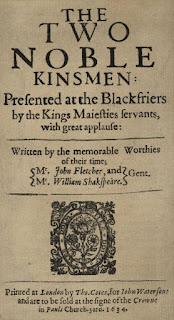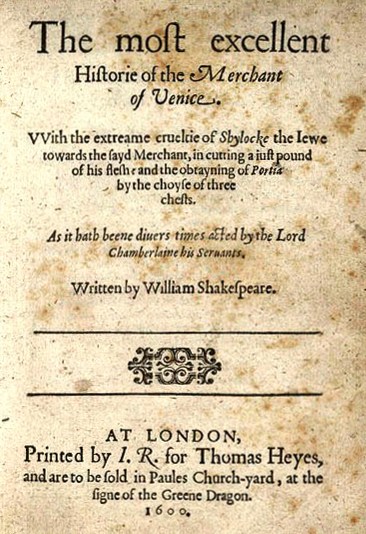Titus Adronicus - "Give us the proudest prisoner of the Goths, that we may hew his limbs..."
Titus Andronicus
"Give us the proudest prisoner of the Goths,
That we may hew his limbs, and on a pile
Ad manes fratrum sacrifice his flesh..."Some have argued Shakespeare couldn’t have possibly written this play. The plot is unlike what he had written before, the violence is unlike what up to this point he had written and the pace is unlike most of his other plays. All that said, the verse and dialogue in the play is definitely Shakespeare’s and this is what adds a lyrical beauty to what could almost be an overly violent almost un-performable play.
In 1591, Shakespeare was not the house playwright for the Lord Chamberlain’s Men yet. He was primarily an actor who did some writing for extra money. So he would definitely have not been on profit share in 1591. Profit share would bring in about 1 to 2 pounds for the playwright but Shakespeare probably got as much as 5 pounds after 1599 because he was also a part owner of the Globe Theatre building. I like to think that ‘Titus Andronicus’ is a play that Henslow or someone had had on the books for a while. It is a remake of a story that had been done countless times before. Shakespeare had had a few successes over the last two or three years and he probably decided to take the 2-3 pounds on offer to try to finish what others couldn’t. Besides, another 2 pounds for the script and about 10 pounds of it is successful in performance would get all of his family through the Winter. But first he had to work his way through a city rubbish dump size set of pages of other peoples attempts and see if any shiny trinkets of action, verse and characters were there for the picking. It is not a great play and it is a mish-mash of styles and genres but it does shows the deft hand of a very good dramaturg/editor/playwright.
Act I
Even from the outset you can see Shakespeare editing the action but using his gift of verse to lift the action of the events above the litany of violent acts which dominate it. ‘Titus Andronicus’ is like a modern action flick. The play does not stop and is remorseless in its violence. There are about five violent happenings every act and at least one violent act of mutilation, rape or death every 100 lines. Before the play begins, Titus Andronicus has lost 21 sons in the field of battle and he returns to Rome to bury the latest dead sons. All of Act 1 is done in one long, action-packed scene. Alarbus (Tamora, Queen of the Goth’s eldest son) is killed offstage by the swords of Titus’ remaining sons and his limbs “hewed” or “lopped”. Titus stabs Mutius (his own son) on stage and Mutius dies. Saturninus, the new emperor of Rome, takes Tamora, Queen of the Goths, for his wife since his Lavinia was stolen away by his brother Bassianus. Lavinia is either ravished, a victim of rape or she succumbs to Bassianus offstage. Act 1 ends with Tamora threatening to massacre all of Titus’ family. When was the audience meant to take a breath?
Act II – “… make pillage of her chastity…”
“This is the day of doom for Bassianus:
His Philomel must lose her tongue to-day,
Thy sons make pillage of her chastity
And wash their hands in Bassianus' blood.
Wow. Act 2 of Titus is very hard to work through. The violence is overwhelming. Tamora being discovered with her lover by Bassianus and Lavinia is berated by them. She then commands her son’s to kill Bassianus. Her sons announce their intention to rape Lavinia and even after Lavinia pleads with Tamora as a woman and a mother to save her life or kill her, Tamora shows herself to be remorseless and even suggests to her sons that they make sure Lavinia is silent about all these events after they have had their way. The continual references to pits and holes is openly Freudian and the lack of sympathy shown for Lavinia by Tamora and her sons is almost sickening. Lavinia is almost represented as a victim responsible for her own attack. It is a very disturbing scene.
"Enter...Lavinia, her hands cut off, and her tongue cut out, and ravished."
After the rape, Chiron and Demetrius return on stage with Lavinia, whose hands and tongue they have cut off in order to stop her from naming her attackers. Lavinia is discovered by her uncle Marcus, who shows the first sympathetic expressions in the whole play (without this this act of the play would be too much to take). He gently takes Lavinia to her father. Meanwhile, the body of Bassianus is discovered in a pit, but Titus Andronicus’ sons who have fallen into the pit by an accident, and they are accused of his murder as ‘proven’ by their presence in the pit and a false letter revealed by Tamora which ‘reveals’ their intentions. At the end of Act 2, Tamora and the Evil Revengers seem to be winning hands down.
The Score:
Tamora 2
Titus 1
Act III
“She says she drinks no other drink but tears,
Brew'd with her sorrow, mesh'd upon her cheeks…
Peace, tender sapling; thou art made of tears,
And tears will quickly melt thy life away…”
This is powerful drama and classic Shakespeare. Anyone who doubts Shakespeare wrote all or most of ‘Titus Andronicus’ needs to re-read Act 3 of the play and let the golden hues of Shakespeare’s verse, heart wrenching characters and staging wash over them.
Titus, the warrior, on his knees, pleading for his (falsely accused) sons’ lives to be spared. The pillars of Rome are cracked and falling. The “map of woe” extended to New Worlds. The humiliation and sorrow escalate when Lavinia, ravished and mutilated in hands and tongue, is brought back to him. On top of this, Titus has his own hand chopped off to secure the release of his sons, only to have his hand returned along with the heads of his two sons. He realizes that “tears will quickly melt a life away” and that the tongue of revenge should “plot some deuce of further misery”. We see Titus in an almost absurdly melodramatic scene, feeding his daughter Lavinia with the one hand he has left. The warrior has once again become nourisher. The pivot for the revenge to come, is Lavinia, mute and suckled by her father.
Tamora 5
Titus 1
Titus Andronicus Acts IV & V
“…There is enough written upon this earth
To stir a mutiny in the mildest thoughts… “
Whoever said that Shakespeare doesn’t give actors much direction should read the directions given in Act IV of “Titus Andronicus’:
Lavinia takes the staff in her mouth, and guides it with her stumps, and writes the names of her attackers in the sand.
The action, murders and revelations run mercilessly like floodwaters throughout the play. Lavinia reveals the names of her attackers and Titus forges revenge. Meanwhile, Tamora has given birth to a son whose father is Aaron, the Moorish slave. Aaron takes his son with him away from Rome. Paternal instinct seems alive and well. There is a sense that Aaron’s evil acts come from the seat of revenge whose seed is the racism that he has suffered. He proudly decries that:
"Coal-black is better than another hue
In that it scorns to bear another hue."
With justice conveniently and symbolically sidelined, Titus makes Marcus, Young Lucius and Caius et al shoot arrows at the constellations (and Saturninus’ house) pleading to the Gods and announcing to all, Saturninus’ crimes. Needless to say, Saturninus is angry and, never hearing of the saying “Don’t shoot the messenger”, kills Titus’ messenger, a poor clown whose comic purpose is strengthened by his departure.
It is obvious that Tamora didn’t play dress-up and go to a Drama club when she was younger, since her attempt to disguise herself as Revenge, and her sons as Rape and Murder to taunt Titus whom they think has been driven mad, falls flat when Titus “o'erreaches them in their own devices". Tamora leaves her sons with Titus who then bleeds them slowly (with Lavinia holding the bowl that catches their blood), kills them and tells us of how he will use their blood and bones in a culinary 'invention' task that I have never seen on Masterchef or any other cooking challenge program.
I am sure the Tiber River runs totally red by the end of the play. In Act V, the corpse count rises to epic proportions. Titus stabs and kills his own daughter Lavinia. Titus reveals (and punctuates in a rhyming couplet) that Tamora’s son’s have been served to her in a pie.
“Why, there they are both, baked in that pie;
Whereof their mother daintily hath fed,
Eating the flesh that she herself hath bred.”
Titus, Saturninus and Tamora are all killed. Marcus and Lucius seem to escape the swinging blades of revenge and Rome will live on as the cathartic waters of the Tiber wash Revenge’s crimson colours into the sea at Ostia.
Tamora 6
Titus 5
Shakespeare returns to the War of the Roses in ‘Richard III’…




Comments
Post a Comment